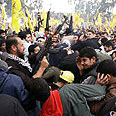
Mubarak: Palestinians will pay a heavy price
In interview with official news agency, Egyptian president warns that 'if Palestinian infighting continues, the Palestinian people will be the ones to pay the price.' He draws link between Syrian, Palestinian issues, warns Israel that 'stability in the Middle East will not be reached as long as an overall and just solution for the Palestinian problem is not found'
In an interview with the official Egyptian news agency, published Tuesday in Arab newspapers, Mubarak warned that the crisis could negatively affect the Palestinian people's hopes to establish an independent state.
"If the struggle between the Palestinians continues, the Palestinian people will be the ones to pay the price. They will turn into fighters fighting each other, and the spirit of revenge will prevail. This will badly harm the Palestinian problem, particularly at the current stage," the Egyptian president said.
Mubarak called on the Palestinian people to end the internal struggle and put the Palestinian top interests over any other issue.
'No stability without solution for Palestinians'
The Egyptian president also referred to the Syrian issue, saying that Syria was ready to enter peace talks with Israel if only Israel would manifest its seriousness.
He linked between the Syrian issue and the Palestinian issue, saying that "stability in the Middle East will not be reached as long as an overall and just solution for the Palestinian problem is not found."
He added that "many opportunities have been missed throughout the years to solve the Palestinian problem, for many different reasons."
In the interview, Mubarak expressed his hope that the negotiations between Israel and the Palestinians on the one hand, and between Israel and Syria on the other hand, are resumed in the near future, in order to set the peace process in motion and prevent the crisis in the region.
Mubarak again criticized the way and the date in which Iraqi President Saddam Hussein was hanged. He said he was surprised to hear about the execution while he left for the Eid al-Adha prayer, in spite of the fact that he sent a letter to US President George W. Bush asking him not to implement the sentence during the Muslim holiday.
"The execution was carried out in a barbaric war. Those who implemented the sentence did not have mercy on the dignity afforded to the dead, but rather broadcast the moments before the execution and Saddam's pictures after the execution on satellite TV. These pictures were viewed by the entire world, and this caused sadness and grief," he said.
Mubarak added that "world leaders, in the Arab world, Europe, and even the US, criticized the way the death sentence against the late Iraqi president was implemented and the insistence to execute him, of all days, on a day of holiday for Muslims across the world."










